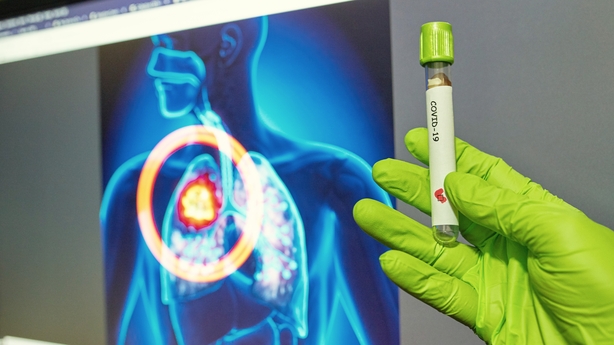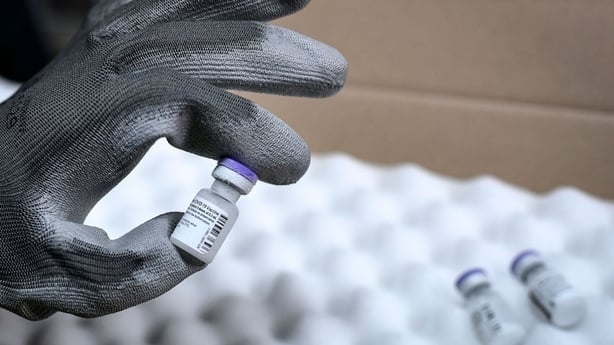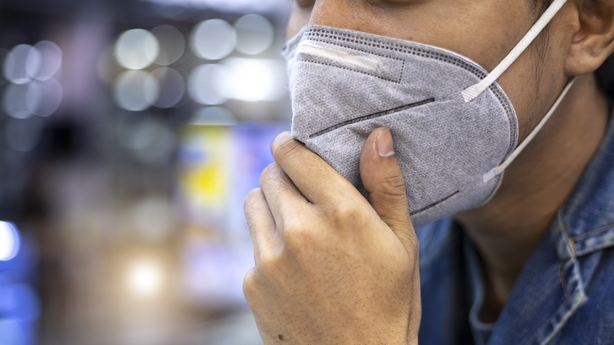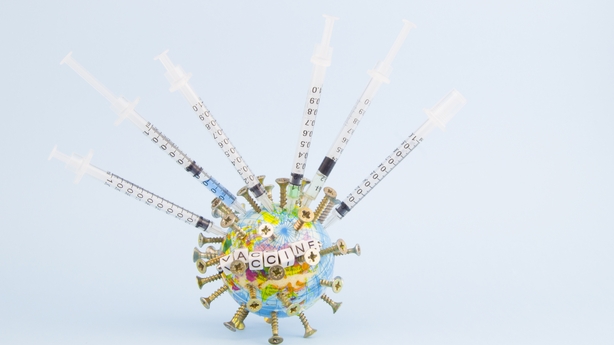The tide is beginning to turn in the fight against coronavirus here.
But it may not always feel that way.
That’s because this latest tide was a tsunami and given the scale of what the health system has been forced to deal with, the ebb and flow will take some time to settle.
The sheer scale of figures over the last week has also been daunting. The health system and its staff have faced unprecedented pressures. These days will last long in the memory of every doctor, nurse and healthcare employee faced with the unimaginable.
For patients too, who must go to hospital, there is a terrible road of uncertainty.

Yesterday, there were over 170 patients in ICU with Covid-19. These are record numbers in terms of the disease. Most of these patients are on ventilators. We know from doctors in this specialty that ventilation is not a treatment. It’s a support mechanism, to give the body time to heal.
A patient needs to be strong to survive ventilation. The average time on a ventilator is 7-10 days. Often patients are under anaesthetic for a period of time. Sometimes ventilation can do more harm in the long term. Ventilation is not for everyone. Deciding whether a patient should be placed on a ventilator is not just about age; there are many factors, including the patient’s own wishes.
NPHET predicts that there will be a large number of deaths in the coming weeks. The time lag between the recent surge of cases we saw in the community and admission to hospital is responsible for this. The lower projections are that by the end of January there will be 650-800 people in hospital and 250-300 in ICU. Let’s hope the more optimistic modelling plays out.
So much data is released each day now on Covid-19 that it probably makes some people immune from being shocked. But every case is an individual and, for many, their lives and those of their families have been turned upside down. There have been so many deaths and also many people who continue to suffer the effects of long-Covid. Yesterday, the Central Statistics Office said that since the start of the pandemic, the total number of people who have died from Covid-19 here is 2,096 – with a further 231 deaths cited as probable deaths linked to the virus. Because it can be up to three months or more before deaths are officially registered, the impact of Covid-19 will take some time to determine.

At last, official data on the number of vaccinations administered is being published on Ireland’s Covid-19 Data Hub. The current data shows that 77,303 first doses of the Pfizer-BionTech vaccine have been administered. It places Ireland high in the league table of vaccines administered for every 100 people, for now.
Along with the daily case numbers and deaths from this disease, the public wants to see the daily progress on vaccination. More detail is being promised over the coming weeks.
Although comparisons with other countries are not always simple, it is also important to be able to get a sense of where Ireland stands in relation to vaccinations. Some countries may be reporting vaccinations issued, not the number administered, so be careful with comparisons.
Widespread vaccination is an important part of the journey we now are on, a vital partner accompanying us on this long road to freedom. Realistically, we are probably some months away from the lifting of restrictions, given the case numbers and hospitalisations being reported currently.
The promise is that 700,000 vaccinations will have been given by the end of March, with the first three groups – frontline health staff, nursing home residents and those over 70 years – given the jab.
We have the Pfizer-BionTech vaccine coming in regular deliveries; the first batch of the Moderna vaccine arrived with 3,600 doses this week, and the hope is that the Astra-Zeneca/Oxford vaccine will get approval by 29 January.
Pfizer has said it is scaling up manufacturing operations to increase dose availability and output. It has to make modifications to the process and facility that will require additional regulatory approvals. So although this will temporarily affect shipments in late January to early February, it will provide a significant increase in doses available for patients in late February and March.

There has been much discontent expressed this week by some health staff about vaccination, or the lack of it. Some nurses and doctors have claimed that some administrators and non-patient-facing staff were being vaccinated, ahead of the priority groups. I asked the HSE about this and they said they had no specific accounts of deviation from the prioritisation, “but if any specific incidents of inappropriate prioritisation for vaccine are identified this will be addressed”.
Because of the ease of administration, it’s the Astra-Zenca vaccine that GPs and pharmacists are likely to be using when they begin to enter the general vaccination programme in a few months.
The Irish College of General Practitioners has said that a registration system for all GPs and their practice teams had been resolved, and that all GPs and their teams expect to be vaccinated via three mass vaccination centres, being set up from this weekend.
Ireland has to get the vaccination programme right. There will be no forgiveness for any delays on our part in delivering the immunisation programme. People will expect it to be one of military precision, 24 hours a day, seven days a week. The public will demand nothing short of a war effort, in a world emergency, the like of which has not been experienced before.

That may mean commandeering offices and buildings that are not being occupied due to the stay-at-home requirements, and using suitable premises as mass vaccination centres. Every day that the country avoids from lockdown is also taxpayers’ money saved for when the final bill for all of this has to be paid. Even now, that bill will clearly be astronomical and a burden on future generations.
Given the cost and for reasons of accountability too, it’s likely that if and when the threat from Covid-19 has passed, there will be pressure for an independent review of how Ireland responded to coronavirus. There will be lessons to learn and no-one should be afraid of that, unless it turned into an ugly star-chamber. Always remember that when you point a finger at someone, there are three fingers pointing back at you. In this ongoing battle with coronavirus, we all have roles and responsibilities and it can be easy to pass judgment on others.
We are still in the midst of the crisis and deep in the worst phase. No-one has the full answers. Much is still unknown about Covid-19. People are tired, worn down, frustrated, angry and looking for targets for blame.
People’s hopes and dreams have been upended. Friendships put on ice. Marriages delayed or cancelled. Relationships frazzled and under the microscope. Mental health under severe strain. Domestic violence increasing. And some children frightened or confused. What a collective horror story it has been.
The last thing people will tolerate in this crisis is any suggestion of red tape or bureaucracy getting in the way of the efficient delivery of the vaccination programme by European authorities. Many European Union nations say they are receiving lower-than-expected supplies of vaccines. There are also concerns about the timetables for future deliveries.

Questions were raised this week about whether the European Commission bought sufficient vaccines in the first round and whether other countries did side deals for extra batches. The EU vaccine negotiator has denied bilateral supply deals. The commission said it had no knowledge of any individual member state signing bilateral deals, despite media reports.
“These parallel contracts have been much rumoured. I haven’t seen yet one. And I don’t think I will ever see one. It’s something that in my view does not exist,” said Sandra Gallina, the head of DG SANTE, the Directorate-General for Health and Food Safety, and lead vaccine negotiator for the commission. There is, of course, nothing to prevent countries doing deals, after any EU deal is completed.
The Government review of where we are at the end of January is unlikely to result in any notable reduction in restrictions. Let’s face it, another St Patrick’s Day will likely come and go and there will still be significant restrictions. This time around, the Government will be slow to take the foot off the pedal, especially with the danger posed by the new variants. There are three at the moment – the variant first identified in the UK, South Africa and Brazil. These new variants will make it difficult to get the R number low.
Hopefully, Ireland can look forward to a reasonable summer, but that remains uncertain. Some projections suggest that the 15 groups who are due to receive vaccines will have received them by the end of September. The mix of adherence to the public health measures, along with an efficient and effective vaccination programme, will chart the course of the months ahead. As in all things in life, no doubt there will be mistakes and some setbacks.
The Vaccination Task Force has done and continues to do very important work. The scale of data being produced each day now by the HSE, the Health Protection Surveillance Centre and NPHET experts is also impressive. People can now track the movement of the disease better than ever before. That is empowering for people. Although there are various advisory groups giving views on aspects of Covid-19, the NPHET remains the overarching body that advises Government. For example, any change to the vaccine schedule would have to go to it, and Dr Tony Holohan, for a view.
The backlog of cases that built up around Christmas has been a problem. It resulted in some daily case figures of over 8,000. For many days, there was a mix of new cases and backlog cases and we have still to see the official number of new cases that occurred each day during the festive season. Given that the public has seen ‘daily’ case numbers of 8,000 reported – it may colour their perception of future daily case numbers and trends. If we get to under 1,000 cases a day, that could fuel pressure for a relaxation of some measures.
As case numbers decline over the coming weeks, as a result of the Level 5 lockdown rules, it should help lift the national mood.

People have felt let down by some of the approach to dealing with Covid-19. In early August, random testing at airports was promised. Only this weekend the requirement to show a negative Covid-19 test was introduced for people arriving into Ireland. But it does not apply to people flying into the North (the so-called Dublin Dodge) and coming into the Republic of Ireland. This, despite the emergence of several new strains of the virus.
For people to continue to have hope and commitment to the existing public health measures, they need to have some sense of the end game. Although vaccinations are not a silver bullet, they are a defining element in this collective effort.
Nothing short of a national mobilisation of all elements of society is needed to deliver the biggest vaccination programme the State has been tasked to deliver.
January is such a cruel, cold, dark month. The sooner we are rid of it the better.
But the days are getting brighter and 2021 has yet to fully reveal what it has in store for us.
There is a long road ahead to freedom.
At least now we have some sense of direction.
Every effort, from every quarter will be needed, to avoid being knocked off course.
